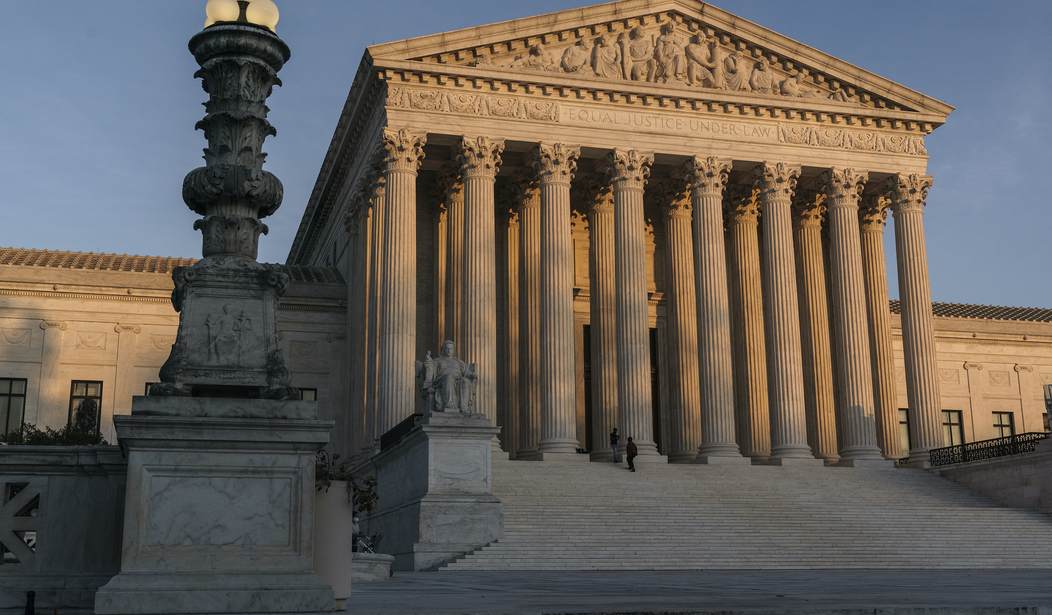As Landon reported on Monday, Senate Minority Leader Mitch McConnell indicated that should he become the majority leader in 2022, and a vacancy on the U.S. Supreme Court comes up in 2024, it is "highly unlikely" McConnell would let President Joe Biden confirm someone to the spot. This is the exact same stance which then Majority Leader McConnell took in 2016. Because Democrats continue to freak out, however, it's time to review the role of advice and consent once more.
Here's what McConnell said on Hugh Hewitt's radio program:
I think in the middle of a presidential election, if you have a Senate of the opposite party of the president, you have to go back to the 1880s to find the last time a vacancy was filled. So I think it's highly unlikely. In fact, no, I don't think either party if it controlled, if it were different from the president, would confirm a Supreme Court nominee in the middle of an election. What was different in 2020 was we were of the same party as the president.
It's as simple as that. You can disagree with the reasoning, but you can't really argue with it. Such was the reason why Merrick Garland was not given a hearing when he was nominated by then-President Barack Obama in 2016, after Justice Antonin Scalia passed away in February 2016. Garland then went on to be confirmed in a vote of 70-30 as Biden's Attorney General, so it's safe to say he's doing all right for himself.
Sen. Ben Cardin (D-MD), however, didn't take too kindly to McConnell's response. Even though it has been McConnell's consistent and public statement, Sen. Cardin called it "an outrageous statement."
The senator then went on to acknowledge the constitutional roles of the president and the Senate, sort of. "The Constitution gives the president the power to nominate to the Supreme Court," he pointed out, which it does. "The Senate has the right to either confirm or not confirm the nominee," another true point. Cardin went to to say the Senate "doesn't have the right to hold up a president's nominee for two years and not vote on it."
Recommended
Sen. Ben Cardin: "The problem is Mitch McConnell. That's an outrageous statement that he made. The Constitution gives the president the power to nominate to the Supreme Court... the Senate doesn't have the right to hold up a president's nominee." pic.twitter.com/i38cOZWXP8
— The Hill (@thehill) June 18, 2021
Sen. Cardin also hopes that the Republican caucus will reject McConnell's notion, sound though it may be.
As Cardin himself acknowledged, advice and consent means "either confirm or not confirm the nominee." That includes the Senate deciding whether, in that advice and consent role, how far along that nominee is going to move along in the confirmation process.
McConnell took his role as majority leader very seriously and will the next time he does have such a position. Whether you love him or hate him, this shouldn't be news.
The Republican leader has cited historical statistics before. According to a September 21, 2020 press release from Republican Leader McConnell's office:
15 TIMES: In U.S. history, a Supreme Court vacancy arose in a presidential election year and the President nominated someone that year.
- 8 TIMES: Voters had chosen a Senate majority of the same party as the President. 7 of those 8 nominations were confirmed.
- The only such nominee who was not confirmed faced bipartisan opposition over serious questions of judicial ethics and personal finances.
- Apart from that strange exception, no Senate has failed to confirm a nominee in the circumstances that face the body now.
- 7 TIMES: Voters had chosen an opposite-party Senate to check and balance the President. Only 2 of these 7 nominations were confirmed, the last in 1888.
Again, McConnell's statement on Monday shouldn't come as a shock, to anyone. And many weren't shocked.
"You stabbed me!"
— Ken Tremendous (@KenTremendous) June 14, 2021
"Correct."
"Are you going to stab me again?"
"Yes."
"Well, I have a knife too!"
"..."
"But I am going to put down my knife, in a spirit of cooperation."
"Okay."
"What are you going to do after I put down my knife?"
"I'm going to stab you." https://t.co/DrYFl8mH57
Few organizations need fewer reasons to do anything, than it takes for Demand Justice to push court packing and for Justice Stephen Breyer to retire. The former is included in their Twitter handle, the latter once again resurfaced after McConnell's comments.
CC: Justice Breyer https://t.co/KudcnBLn4s
— Demand Justice #ExpandTheCourt (@WeDemandJustice) June 14, 2021
— Demand Justice #ExpandTheCourt (@WeDemandJustice) June 14, 2021
NEW coalition calling on Justice Breyer to retire to protect our democracy:@womensmarch@UltraViolet @justicedems@Blklivesmatter@WorkingFamilies@BattleBornProg@sunrisemvmt@commondefense@AbortionStories@TakeBacktheCt@PeoplesParity https://t.co/gtFIZljHsi
— Demand Justice #ExpandTheCourt (@WeDemandJustice) June 15, 2021
Leading scholars of the law are speaking up about the need for Justice Breyer to retire. pic.twitter.com/jgolfTqTla
— Demand Justice #ExpandTheCourt (@WeDemandJustice) June 16, 2021
There are few reasons worth sympathizing with a justice nominated by a Democrat--in Breyer's case, Bill Clinton--than people analyzing his every move and pointing out why it means he should retire.
What a nice way for Justice Breyer to go out!https://t.co/6IjyTOjfym
— Brian Fallon (@brianefallon) June 17, 2021
It's almost like these people forget that the Constitution says justices serve for life. Then again, there's plenty about the Constitution that they seem to forget. To his credit, Sen. Cardin did acknowledge the former, it would be nice if he could appreciate the full context of advice and consent, which does not always mean bringing a nominee to the floor for a vote.

























